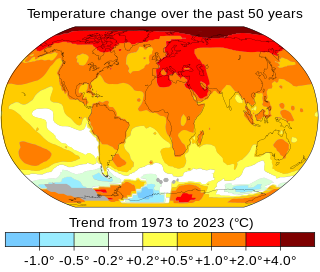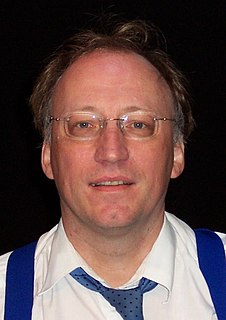Environmental skepticism is the belief that statements by environmentalists, and the environmental scientists who support them, are false or exaggerated. The term is also applied to those who are critical of environmentalism in general. It can additionally be defined as doubt about the authenticity or severity of environmental degradation. Environmental skepticism is closely linked with anti-environmentalism and climate change denial.
Carbon neutrality refers to achieving net-zero carbon dioxide emissions. This can be done by balancing emissions of carbon dioxide with its removal or by eliminating emissions from society. It is used in the context of carbon dioxide-releasing processes associated with transportation, energy production, agriculture, and industry.

Human impact on the environment or anthropogenic impact on the environment includes changes to biophysical environments and to ecosystems, biodiversity, and natural resources caused directly or indirectly by humans, including global warming, environmental degradation, mass extinction and biodiversity loss, ecological crisis, and ecological collapse. Modifying the environment to fit the needs of society is causing severe effects. Some human activities that cause damage to the environment on a global scale include population growth, overconsumption, overexploitation, pollution, and deforestation, to name but a few. Some of the problems, including global warming and biodiversity loss pose an existential risk to the human race, and some experts attribute this crisis to overall human overpopulation.

Mark Lynas is a British author and journalist whose work is focused on environmentalism and climate change. He is a contributor to New Statesman, The Ecologist, Granta and Geographical magazines, and The Guardian and The Observer newspapers in the UK; he also worked on the film The Age of Stupid. He was born in Fiji, grew up in Peru and the United Kingdom and holds a degree in history and politics from the University of Edinburgh. He has published several books including Six Degrees: Our Future on a Hotter Planet (2007) and The God Species: Saving the Planet in the Age of Humans (2011). He has stated "I think there is a 50–50 chance we can avoid a devastating rise in global temperature." Lynas is a communications strategist and climate lead for the Alliance for Science at Cornell University as well as a fellow of the German skeptics organization, GWUP.

Sir Jonathon Espie Porritt, 2nd Baronet, CBE is a British environmentalist and writer. He is known for his advocacy of the Green Party of England and Wales. Porritt frequently contributes to magazines, newspapers and books, and appears on radio and television.

Climate change includes both global warming driven by human-induced emissions of greenhouse gases and the resulting large-scale shifts in weather patterns. Though there have been previous periods of climatic change, since the mid-20th century humans have had an unprecedented impact on Earth's climate system and caused change on a global scale.

An electric water boiler, also called a thermo pot, is a consumer electronics small appliance used for boiling water and maintaining it at a constant temperature. It is typically used to provide an immediate source of hot water for making tea, hot chocolate, coffee, instant noodles, or baby formula, or for any other household use where clean hot water is required. They are a common component of Japanese kitchens and the kitchens of many East Asian countries but are found in varying use globally. Some thermo pots are designed with a feature that can purify water.
Energy Saving Trust (EST) is a British organization devoted to promoting energy efficiency, energy conservation, and the sustainable use of energy, thereby reducing carbon dioxide emissions and helping to prevent man-made climate change. It was founded in the United Kingdom as a government-sponsored initiative in 1992, following the global Earth Summit.
Earthscan is an English-language publisher of books and journals on climate change, sustainable development and environmental technology for academic, professional and general readers.

Climate change denial, or global warming denial, is denial, dismissal, or unwarranted doubt that contradicts the scientific consensus on climate change, including the extent to which it is caused by humans, its effects on nature and human society, or the potential of adaptation to global warming by human actions. Many who deny, dismiss, or hold unwarranted doubt about the scientific consensus on anthropogenic global warming self-label as "climate change skeptics", which several scientists have noted is an inaccurate description. Climate change denial can also be implicit when individuals or social groups accept the science but fail to come to terms with it or to translate their acceptance into action. Several social science studies have analyzed these positions as forms of denialism, pseudoscience, or propaganda.

Felix Dodds is an author, futurist and activist. Born as Michael Nicholas Dodds he took the name Felix Dodds when he was 18. He stood in Mid Derbyshire for the Liberal Democrats in the 2019 General Election. He has been instrumental in developing new modes of stakeholder engagement with the United Nations, particularly within the field of sustainable development. His latest book is Stakeholder Democracy: Represented Democracy in a Time of Fear. In 2019 he was the UK candidate to be the Executive Director of the United Nations Environment Programme. Dodds was the Executive Director of Stakeholder Forum for a Sustainable Future from 1992–2012. He is probably best known as the author of How to Lobby at Intergovernmental Meetings: Mine is a Café Latte, written with co-author Michael Strauss.

Sustainability is the capacity to endure in a relatively ongoing way across various domains of life. In the 21st century, it refers generally to the capacity for Earth's biosphere and human civilization to co-exist. It is also defined as the process of people maintaining change in a homeostasis-balanced environment, in which the exploitation of resources, the direction of investments, the orientation of technological development, and institutional change are all in harmony and enhance both current and future potential to meet human needs and aspirations. For many in the field, sustainability is defined through the following interconnected domains or pillars: environmental, economic and social. Sub-domains of sustainable development have been considered also: cultural, technological and political.

Christopher Frank William Goodall is an English businessman, author and expert on new energy technologies. He is an alumnus of St Dunstan's College, University of Cambridge, and Harvard Business School (MBA).
Geoffrey Beattie FBPsS FRSM FRSA is a psychologist, author and broadcaster. He is Professor of Psychology at Edge Hill University and has been visiting professor at the Bren School of Environmental Science and Management, University of California Santa Barbara. He graduated with a First Class Honours degree from the University of Birmingham and a Ph.D. from the University of Cambridge. He is a Fellow of the British Psychological Society, a Fellow of the Royal Society of Medicine and a Fellow of the Royal Society of Arts.

Avoided Deforestation Partners, or AD Partners, is a non-profit organization under the auspices of the Center for International Policy in Washington, D.C. AD Partners is involved in the global effort to solve climate change by working to end deforestation in tropical rainforest countries. By avoiding the practice of deforestation, i.e., clearing forests to provide inexpensive farmland, the world gains the significant climate benefits of not releasing carbon into the atmosphere. In addition, avoiding deforestation also allows forests to sequester carbon and scrub the air of pollutants. Beyond protecting our air quality, tropical forests create the conditions for rain, recharge our water sources, provide habitats for myriad plant and animal species, and support a way of life for 1.6 billion forest dependent people. Leading scientists and economists say that ending deforestation is the most cost effective and scalable method of reducing greenhouse gases. In fact, they believe that ending deforestation will cut the timeframe for solving the climate crisis in half.

Individual action on climate change can include personal choices in many areas, such as diet, means of long- and short-distance travel, household energy use, consumption of goods and services, and family size. Individuals can also engage in local and political advocacy around issues of climate change.

Tim Jackson is a British ecological economist and professor of sustainable development at the University of Surrey. He is the director of the Centre for the Understanding of Sustainable Prosperity (CUSP), a multi-disciplinary, international research consortium which aims to understand the economic, social and political dimensions of sustainable prosperity. Tim Jackson is the author of Prosperity Without Growth and Material Concerns (1996). In 2016, he received the Hillary Laureate for exceptional mid-career Leadership. His most recent book Post Growth—Life After Capitalism was published in March 2021 by Polity Press.
Low-impact development (LID) has been defined as "development which through its low negative environmental impact either enhances or does not significantly diminish environmental quality".
Climate fiction is literature that deals with climate change and global warming. Not necessarily speculative in nature, works may take place in the world as we know it or in the near future. The genre frequently includes science fiction and dystopian or utopian themes, imagining the potential futures based on how humanity responds to the impacts of climate change. Technologies such as climate engineering or climate adaptation practices often feature prominently in works exploring their impacts on society. Climate fiction is distinct from petrofiction which deals directly with the petroleum culture and economy.

Climate Change Denial: Heads in the Sand is a 2011 non-fiction book about climate-change denial, coauthored by Haydn Washington and John Cook, with a foreword by Naomi Oreskes. Washington had a background in environmental science prior to authoring the work; Cook, educated in physics, founded (2007) the website Skeptical Science, which compiles peer-reviewed evidence of global warming. The book was first published in hardcover and paperback formats in 2011 by Earthscan, a division of Routledge.













